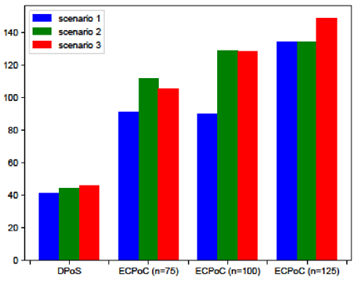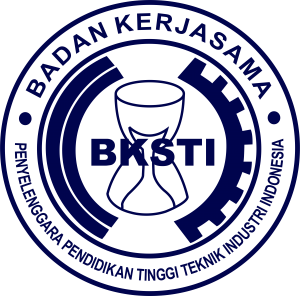Ecpoc: an evolutionary computation-based proof of criteria consensus protocol
DOI:
https://doi.org/10.12928/ijio.v3i2.6049Keywords:
Blockchain, Consensus Protocol, DPoS, Metaheuristic algorithmAbstract
Recently, blockchain technology has been applied in many domains in our life. Blockchain networks typically utilize a consensus protocol to achieve consistency among network nodes in a decentralized environment. Delegated Proof of Stake (DPoS) is a popular mechanism adopted in many networks such as BitShares, EOS, and Cardano because of its speed and scalability advantages. However, votes that come from nodes on a DPoS network tend to support a set of specific nodes that have a greater chance of becoming block producers after voting rounds. Therefore, only a small group of nodes can be selected to become block producers. To address this issue, we propose a new protocol called Evolutionary Computation-based Proof of Criteria (ECPoC), which uses ten criteria to evaluate and select a new block procedure in each round. Next, a set of optimal weights used for maximizing the network’s decentralization level is identified through the use of evolutionary computation algorithms. The experimental results show that our consensus significantly enhances the degree of decentralization in the selection process of witness nodes compared to DPoS. As a result, ECPoC facilitates fairness between nodes and creates momentum for blockchain network development
References
S. Nakamoto, "Bitcoin: A peer-to-peer electronic cash system," in Decentralized Business Review, p. 21260, 2008. [Online]. Available: https://www.bitcoinpaper.info/bitcoinpaper-html/
S. King and S. Nadal, "PPCoin: Peer-to-peer crypto-currency with proof-of-stake," in self-published paper, August, vol. 19, 2012. [Online]. Available: https://bitcoin.peryaudo.org/vendor/peercoin-paper.pdf
Yang, F., Zhou, W., Wu, Q., Long, R., Xiong, N.N. and Zhou, M., " Delegated proof of stake with downgrade" in IEEE Access, vol. 7, p. 118541-118555, 2019. [Online]. Available: https://ieeexplore.ieee.org/abstract/document/8798621
Ehmke, C., Wessling, F., and Friedrich, C. M. (2018). Proof-of-property: a lightweight and scalable blockchain protocol. Presented at International Workshop on Emerging Trends in Software Engineering for Blockchain, 2018. [Online]. Available: https://dl.acm.org/doi/abs/10.1145/3194113.3194122
De Angelis, S., Aniello, L., Baldoni, R., Lombardi, F., Margheri, A., and Sassone, V. (2018). PBFT vs proof-of-authority: Applying the CAP theorem to permissioned blockchain. Presented at Italian Conference on Cyber Security, 2018. [Online]. Available: http://ceur-ws.org/Vol-2058/paper-06.pdf
Bravo-Marquez, F., Reeves, S., and Ugarte, M. (2019). Proof-of-learning: a blockchain consensus mechanism based on machine learning competitions. Presented at IEEE International Conference on Decentralized Applications and Infrastructures (DAPPCON), 2019. [Online]. Available: https://ieeexplore.ieee.org/document/8783030
Y. Xiao, N. Zhang, W. Lou and Y. T. Hou, "A survey of distributed consensus protocols for blockchain networks," in IEEE Communications Surveys & Tutorials, vol. 22, p. 1432–1465, 2020. [Online]. Available: https://ieeexplore.ieee.org/abstract/document/8972381
G.-T. Nguyen and K. Kim, "A survey about consensus algorithms used in blockchain," in Journal of Information processing systems, vol. 14, p. 101–128, 2018. [Online]. Available: https://www.koreascience.or.kr/article/JAKO201810256452304.page
E. K. Wang, Z. Liang, C.-M. Chen, S. Kumari and M. K. Khan, "PoRX A reputation incentive scheme for blockchain consensus of IIoT," in Future Generation Computer Systems, vol. 102, p. 140–151, 2020. [Online]. Available: https://www.sciencedirect.com/science/article/abs/pii/S0167739X19310581
B. Yu, J. Liu, S. Nepal, J. Yu and P. Rimba, "Proof-of-QoS QoS based blockchain consensus protocol," in Computers & Security, vol. 87, p. 101580, 2019. [Online]. Available: https://www.sciencedirect.com/science/article/pii/S0167404818313774
J.-H. Huh and S.-K. Kim, "The blockchain consensus algorithm for viable management of new and renewable energies," in Sustainability, vol. 11, p. 3184, 2019. [Online]. Available: https://www.mdpi.com/2071-1050/11/11/3184
Y. P. Tsang, K. L. Choy, C. H. Wu, G. T. S. Ho and H. Y. Lam, "Blockchain-driven IoT for food traceability with an integrated consensus mechanism," in IEEE Access, vol. 7, p. 129000–129017, 2019. [Online]. Available: https://ieeexplore.ieee.org/abstract/document/8830460
D. Schwartz, N. Youngs, A. Britto and others, "The ripple protocol consensus algorithm," in Ripple Labs Inc White Paper, vol. 5, p. 151, 2014. [Online]. Available: https://oarklibrary.com/file/2/8ce1adff-37e5-47c3-a13e-eea30323bcb7/44e6c541-98ee-4f8b-9f7b-89e92baab412.pdf
N. Bozic, G. Pujolle and S. Secci. (2016). A tutorial on blockchain and applications to secure network control-planes. Presented at the 3rd Smart Cloud Networks & Systems (SCNS), p. 1–8, 2016. [Online]. Available: https://ieeexplore.ieee.org/abstract/document/7870552
K. Li, H. Li, H. Hou, K. Li and Y. Chen. (2017). Proof of vote A high-performance consensus protocol based on vote mechanism & consortium blockchain. Presented at IEEE 19th International Conference on High Performance Computing and Communications; IEEE 15th International Conference on Smart City; IEEE 3rd International Conference on Data Science and Systems (HPCCSmartCityDSS), 2017. [Online]. Available: https://ieeexplore.ieee.org/abstract/document/8291964/
M. Divya and N. B. Biradar, "IOTA-next generation block chain," in Int. J. Eng. Comput. Sci, vol. 7, p. 23823–23826, 2018. [Online]. Available: https://www.sciencedirect.com/science/article/abs/pii/S0167739X19329048
L. Lamport, "Paxos made simple," in ACM SIGACT News (Distributed Computing Column) 32, 4 (Whole Number 121, December 2001), p. 51–58, 2001. [Online]. Available: https://www.microsoft.com/en-us/research/publication/paxos-made-simple/
D. Ongaro and J. Ousterhout. (2014). In search of an understandable consensus algorithm. Presented at USENIX Annual Technical Conference (Usenix ATC 14). [Online]. Available: https://www.usenix.org/conference/atc14/technical-sessions/presentation/ongaro
D. Mazieres, "The stellar consensus protocol A federated model for internet-level consensus," in Stellar Development Foundation, vol. 32, p. 1–45, 2015. [Online]. Available: http://citeseerx.ist.psu.edu/viewdoc/download?doi=10.1.1.696.93&=&rep=rep1&=&type=pdf
G. Christofi, "Study of consensus protocols and improvement of the Delegated Byzantine Fault Tolerance (DBFT) algorithm," in Master thesis, 2019. [Online]. Available: https://upcommons.upc.edu/handle/2117/171243
A. Kiayias, A. Russell, B. David and R. Oliynykov. (2017). Ouroboros A provably secure proof-of-stake blockchain protocol, Presented at Annual international cryptology conference. [Online]. Available: https://link.springer.com/chapter/10.1007/978-3-319-63688-7_12
J. Del Ser, E. Osaba, D. Molina, X.-S. Yang, S. Salcedo-Sanz, D. Camacho, S. Das, P. N. Suganthan, C. A. C. Coello and F. Herrera, "Bio-inspired computation Where we stand and what's next," in Swarm and Evolutionary Computation, vol. 48, p. 220–250, 2019. [Online]. Available: https://www.sciencedirect.com/science/article/abs/pii/S2210650218310277
Hu, Q., Yan, B., Han, Y.,and Yu, J., “An improved delegated proof of stake consensus algorithm,” in Procedia Computer Science, vol. 187, p. 341-346, 2021. [Online]. Available: https://linkinghub.elsevier.com/retrieve/pii/S1877050921009133
Sun, Y., Yan, B., Yao, Y., and Yu, J., “DT-DPoS: A Delegated Proof of Stake Consensus Algorithm with Dynamic Trust,” in Procedia Computer Science, vol. 187, p. 371-376, 2021
Fan, X., and Chai, Q. (2018). Roll-DPoS: a randomized delegated proof of stake scheme for scalable blockchain-based internet of things systems. Presented at Proceedings of the 15th EAI International Conference on Mobile and Ubiquitous Systems: Computing, Networking and Services. [Online]. Available: https://dl.acm.org/doi/abs/10.1145/3286978.3287023

Downloads
Published
How to Cite
Issue
Section
License
Copyright (c) 2022 Thang Nguyen, Hoang-Nam Dinh, Van-Thanh Nguyen, Bao Son Do, Thi Tam Nguyen, Ba Lam Do

This work is licensed under a Creative Commons Attribution-ShareAlike 4.0 International License.
License and Copyright Agreement
In submitting the manuscript to the journal, the authors certify that:
- They are authorized by their co-authors to enter into these arrangements.
- The work described has not been formally published before, except in the form of an abstract or as part of a published lecture, review, thesis, or overlay journal. Please also carefully read the International Journal of Industrial Optimization (IJIO) Author Guidelines at http://journal2.uad.ac.id/index.php/ijio/about/submissions#onlineSubmissions
- That it is not under consideration for publication elsewhere,
- That its publication has been approved by all the author(s) and by the responsible authorities tacitly or explicitly of the institutes where the work has been carried out.
- They secure the right to reproduce any material that has already been published or copyrighted elsewhere.
- They agree to the following license and copyright agreement.
Copyright
Authors who publish with the International Journal of Industrial Optimization (IJIO) agree to the following terms:
- Authors retain copyright and grant the journal right of first publication with the work simultaneously licensed under a Creative Commons Attribution License (CC BY-SA 4.0) that allows others to share the work with an acknowledgment of the work's authorship and initial publication in this journal.
- Authors are able to enter into separate, additional contractual arrangements for the non-exclusive distribution of the journal's published version of the work (e.g., post it to an institutional repository or publish it in a book), with an acknowledgment of its initial publication in this journal.
- Authors are permitted and encouraged to post their work online (e.g., in institutional repositories or on their website) prior to and during the submission process, as it can lead to productive exchanges, as well as earlier and greater citation of published work.

1.png)

